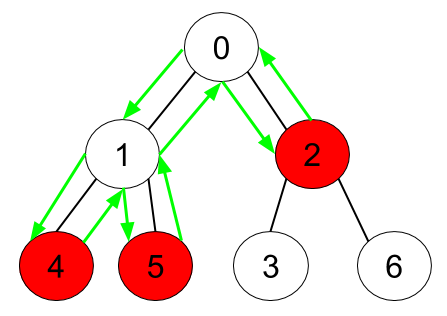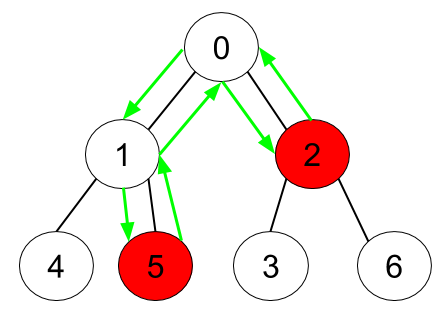2023-01-11 Daily Challenge
Today I have done leetcode's January LeetCoding Challenge with cpp.
January LeetCoding Challenge 11
Description
Minimum Time to Collect All Apples in a Tree
Given an undirected tree consisting of n vertices numbered from 0 to n-1, which has some apples in their vertices. You spend 1 second to walk over one edge of the tree. Return the minimum time in seconds you have to spend to collect all apples in the tree, starting at vertex 0 and coming back to this vertex.
The edges of the undirected tree are given in the array edges, where edges[i] = [ai, bi] means that exists an edge connecting the vertices ai and bi. Additionally, there is a boolean array hasApple, where hasApple[i] = true means that vertex i has an apple; otherwise, it does not have any apple.
Example 1:

Input: n = 7, edges = [[0,1],[0,2],[1,4],[1,5],[2,3],[2,6]], hasApple = [false,false,true,false,true,true,false] Output: 8 Explanation: The figure above represents the given tree where red vertices have an apple. One optimal path to collect all apples is shown by the green arrows.
Example 2:

Input: n = 7, edges = [[0,1],[0,2],[1,4],[1,5],[2,3],[2,6]], hasApple = [false,false,true,false,false,true,false] Output: 6 Explanation: The figure above represents the given tree where red vertices have an apple. One optimal path to collect all apples is shown by the green arrows.
Example 3:
Input: n = 7, edges = [[0,1],[0,2],[1,4],[1,5],[2,3],[2,6]], hasApple = [false,false,false,false,false,false,false] Output: 0
Constraints:
1 <= n <= 105edges.length == n - 1edges[i].length == 20 <= ai < bi <= n - 1fromi < toihasApple.length == n
Solution
class Solution {
vector<bool> hasApple;
vector<vector<int>> neighbors;
bool constructTree(int current, int parrent, vector<bool>& isApple) {
bool hasApple = isApple[current];
for(auto next : neighbors[current]) {
if(next == parrent) continue;
hasApple = constructTree(next, current, isApple) || hasApple;
}
this->hasApple[current] = hasApple;
return hasApple;
}
public:
int minTime(int n, vector<vector<int>>& edges, vector<bool>& isApple) {
hasApple.resize(n);
neighbors.resize(n);
for(const auto &edge : edges) {
neighbors[edge[0]].push_back(edge[1]);
neighbors[edge[1]].push_back(edge[0]);
}
constructTree(0, -1, isApple);
if(!hasApple[0]) return 0;
queue<pair<int, int>> q;
q.push({0, -1});
int answer = 0;
while(q.size()) {
auto [current, parrent] = q.front();
q.pop();
for(auto next : neighbors[current]) {
if(next == parrent) continue;
if(!hasApple[next]) continue;
answer += 2;
q.push({next, current});
}
}
return answer;
}
};
// Accepted
// 55/55 cases passed (189 ms)
// Your runtime beats 86.24 % of cpp submissions
// Your memory usage beats 50 % of cpp submissions (61.3 MB)